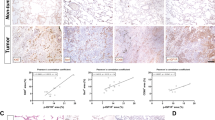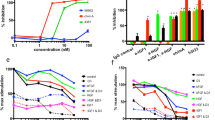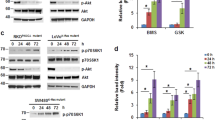Abstract
The type I insulin-like growth factor receptor (IGF1R) regulates multiple aspects of malignancy and is the target of several drugs currently in clinical trials. Although the function of IGF1R in proliferation and survival is well studied, the regulation of metastasis by IGF1R is not as clearly delineated. Previous work showed that disruption of IGF1R signaling by overexpression of a dominant-negative IGF1R inhibited metastasis. To establish a clinically applicable approach to inhibition of metastasis by targeting IGF1R, we examined the effect of an inhibitory antibody against IGF1R, EM164 and its humanized version, AVE1642, on metastasis of cancer cells. EM164 and AVE1642 did not affect primary tumor growth of MDA-435A/LCC6 cells but inhibited metastasis of these cells. Consistent with this inhibition in the formation of metastatic nodules, disruption of IGF1R also resulted in a decreased number of circulating tumor cells in blood of tumor-bearing mice. Disruption of IGF1R with a dominant-negative construct or antibody inhibited invasion across Matrigel in vitro. When tumor cells were directly injected into the circulation through the lateral tail vein of mice, IGF1R disruption also resulted in significant reduction of pulmonary nodules, suggesting that regulation of invasion is not the only function of IGF1R signaling. Further, disruption of IGF1R rendered cells more susceptible to anoikis. Thus, IGF1R regulated metastasis independently of tumor growth. The multiple phenotypes regulated by IGF1R must be considered during development of this therapeutic strategy as inhibition of metastasis independent of inhibition of tumor growth is not easily assessed in phase II clinical trials.
This is a preview of subscription content, access via your institution
Access options
Subscribe to this journal
Receive 50 print issues and online access
$259.00 per year
only $5.18 per issue
Buy this article
- Purchase on Springer Link
- Instant access to full article PDF
Prices may be subject to local taxes which are calculated during checkout











Similar content being viewed by others
References
Allinen M, Beroukhim R, Cai L, Brennan C, Lahti-Domenici J, Huang H et al. (2004). Molecular characterization of the tumor microenvironment in breast cancer. Cancer Cell 6: 17–32.
Baserga R . (2005). The insulin-like growth factor-I receptor as a target for cancer therapy. Expert Opin Ther Targets 9: 753–768.
Boyum A . (1964). Separation of white blood cells. Nature 204: 793–794.
Burtrum D, Zhu Z, Lu D, Anderson DM, Prewett M, Pereira DS et al. (2003). A fully human monoclonal antibody to the insulin-like growth factor I receptor blocks ligand-dependent signaling and inhibits human tumor growth in vivo. Cancer Res 63: 8912–8921.
Byron SA, Horwitz KB, Richer JK, Lange CA, Zhang X, Yee D . (2006). Insulin receptor substrates mediate distinct biological responses to insulin-like growth factor receptor activation in breast cancer cells. Br J Cancer 95: 1220–1228.
Chambers AF, Groom AC, MacDonald IC . (2002). Dissemination and growth of cancer cells in metastatic sites. Nat Rev Cancer 2: 563–572.
Cohen BD, Baker DA, Soderstrom C, Tkalcevic G, Rossi AM, Miller PE et al. (2005). Combination therapy enhances the inhibition of tumor growth with the fully human anti-type 1 insulin-like growth factor receptor monoclonal antibody CP-751 871. Clin Cancer Res 11: 2063–2073.
Dearth RK, Cui X, Kim HJ, Kuiatse I, Lawrence NA, Zhang X et al. (2006). Mammary tumorigenesis and metastasis caused by overexpression of insulin receptor substrate 1 (IRS-1) or IRS-2. Mol Cell Biol 26: 9302–9314.
Dunn SE, Ehrlich M, Sharp NJ, Reiss K, Solomon G, Hawkins R et al. (1998). A dominant negative mutant of the insulin-like growth factor-I receptor inhibits the adhesion, invasion, and metastasis of breast cancer. Cancer Res 58: 3353–3361.
Garcia-Echeverria C, Pearson MA, Marti A, Meyer T, Mestan J, Zimmermann J et al. (2004). in vivo antitumor activity of NVP-AEW541-A novel, potent, and selective inhibitor of the IGF-IR kinase. Cancer Cell 5: 231–239.
Gibson SL, Ma Z, Shaw LM . (2007). Divergent roles for IRS-1 and IRS-2 in breast cancer metastasis. Cell Cycle 6: 631–637.
Gupta GP, Massague J . (2006). Cancer metastasis: building a framework. Cell 127: 679–695.
Gupta GP, Minn AJ, Kang Y, Siegel PM, Serganova I, Cordon-Cardo C et al. (2005). Identifying site-specific metastasis genes and functions. Cold Spring Harb Symp Quant Biol 70: 149–158.
Haluska P, Carboni JM, Loegering DA, Lee FY, Wittman M, Saulnier MG et al. (2006). in vitro and in vivo antitumor effects of the dual insulin-like growth factor-I/insulin receptor inhibitor, BMS-554417. Cancer Res 66: 362–371.
Haluska P, Shaw HM, Batzel GN, Yin D, Molina JR, Molife LR et al. (2007). Phase I dose escalation study of the anti insulin-like growth factor-I receptor monoclonal antibody CP-751 871 in patients with refractory solid tumors. Clin Cancer Res 13: 5834–5840.
Higano CS, Yu EY, Whiting SH, Gordon MS, LoRusso P, Fox F et al. (2007). A phase I, first in human study of weekly IMC-A12, a human insulin like growth factor-I receptor IgG1 monoclonal antibody, in patients with advanced solid tumors. J Clin Oncology 25 (No 18S): 3505.
Jackson JG, White MF, Yee D . (1998). Insulin receptor substrate-1 is the predominant signaling molecule activated by insulin-like growth factor-I, insulin, and interleukin-4 in estrogen receptor-positive human breast cancer cells. J Biol Chem 273: 9994–10003.
Jackson JG, Zhang X, Yoneda T, Yee D . (2001). Regulation of breast cancer cell motility by insulin receptor substrate-2 (IRS-2) in metastatic variants of human breast cancer cell lines. Oncogene 20: 7318–7325.
Kang Y, Siegel PM, Shu W, Drobnjak M, Kakonen SM, Cordon-Cardo C et al. (2003). A multigenic program mediating breast cancer metastasis to bone. Cancer Cell 3: 537–549.
Karp DD, Paz-Ares LG, Blakely LJ, Kreisman H, Cohen RB, Langer CJ et al. (2007). Efficacy of the anti-insulin like growth factor I receptor (IGF-IR) antibody CP 751 871 in combination with paclitaxel and carboplatin as first-line treatment for advanced non-small cell lung cancer (NSCLC). J Clin Oncology 25 (No 18S): 7506.
Laemmli UK . (1970). Cleavage of structural proteins during the assembly of the head of bacteriophage T4. Nature 227: 680–685.
Leonessa F, Green D, Licht T, Wright A, Wingatelegette K, Lippman J et al. (1996). MDA435/LCC6 and MDA435/LCC6(MDR1): ascites models of human breast cancer. Br J Cancer 73: 154–161.
Li SL, Liang SJ, Guo N, Wu AM, Fujita-Yamaguchi Y . (2000). Single-chain antibodies against human insulin-like growth factor I receptor: expression, purification, and effect on tumor growth. Cancer Immunol Immunother 49: 243–252.
Lopez T, Hanahan D . (2002). Elevated levels of IGF-1 receptor convey invasive and metastatic capability in a mouse model of pancreatic islet tumorigenesis. Cancer Cell 1: 339–353.
Maloney EK, McLaughlin JL, Dagdigian NE, Garrett LM, Connors KM, Zhou XM et al. (2003). An anti-insulin-like growth factor I receptor antibody that is a potent inhibitor of cancer cell proliferation. Cancer Res 63: 5073–5083.
Minn AJ, Gupta GP, Siegel PM, Bos PD, Shu W, Giri DD et al. (2005a). Genes that mediate breast cancer metastasis to lung. Nature 436: 518–524.
Minn AJ, Kang Y, Serganova I, Gupta GP, Giri DD, Doubrovin M et al. (2005b). Distinct organ-specific metastatic potential of individual breast cancer cells and primary tumors. J Clin Invest 115: 44–55.
Muller A, Homey B, Soto H, Ge N, Catron D, Buchanan ME et al. (2001). Involvement of chemokine receptors in breast cancer metastasis. Nature 410: 50–56.
Nagle JA, Ma Z, Byrne MA, White MF, Shaw LM . (2004). Involvement of insulin receptor substrate 2 in mammary tumor metastasis. Mol Cell Biol 24: 9726–9735.
Norton L, Massague J . (2006). Is cancer a disease of self-seeding? Nat Med 12: 875–878.
Plymate SR, Bae VL, Maddison L, Quinn LS, Ware JL . (1997). Reexpression of the type 1 insulin-like growth factor receptor inhibits the malignant phenotype of simian virus 40 T antigen immortalized human prostate epithelial cells. Endocrinology 138: 1728–1735.
Plymate SR, Tennant MK, Culp SH, Woodke L, Marcelli M, Colman I et al. (2004). Androgen receptor (AR) expression in AR-negative prostate cancer cells results in differential effects of DHT and IGF-I on proliferation and AR activity between localized and metastatic tumors. Prostate 61: 276–290.
Radisky ES, Radisky DC . (2007). Stromal induction of breast cancer: inflammation and invasion. Rev Endocr Metab Disord 8: 279–287.
Rae JM, Creighton CJ, Meck JM, Haddad BR, Johnson MD . (2007). MDA-MB-435 cells are derived from M14 melanoma cells—a loss for breast cancer, but a boon for melanoma research. Breast Cancer Res Treat 104: 13–19.
Ravid D, Maor S, Werner H, Liscovitch M . (2005). Caveolin-1 inhibits cell detachment-induced p53 activation and anoikis by upregulation of insulin-like growth factor-I receptors and signaling. Oncogene 24: 1338–1347.
Reinmuth N, Fan F, Liu W, Parikh AA, Stoeltzing O, Jung YD et al. (2002). Impact of insulin-like growth factor receptor-I function on angiogenesis, growth, and metastasis of colon cancer. Lab Invest 82: 1377–1389.
Rowinsky EK, Youssoufian H, Tonra JR, Solomon P, Burtrum D, Ludwig DL . (2007). IMC-A12, a human IgG1 monoclonal antibody to the insulin-like growth factor I receptor. Clin Cancer Res 13: 5549s–5555s.
Sachdev D, Hartell JS, Lee AV, Zhang X, Yee D . (2004). A dominant negative type I insulin-like growth factor receptor inhibits metastasis of human cancer cells. J Biol Chem 279: 5017–5024.
Sachdev D, Li SL, Hartell JS, Fujita-Yamaguchi Y, Miller JS, Yee D . (2003). A chimeric humanized single-chain antibody against the type I insulin-like growth factor (IGF) receptor renders breast cancer cells refractory to the mitogenic effects of IGF-I. Cancer Res 63: 627–635.
Sachdev D, Singh R, Fujita-Yamaguchi Y, Yee D . (2006). Down-regulation of insulin receptor by antibodies against the type I insulin-like growth factor receptor: implications for anti-insulin-like growth factor therapy in breast cancer. Cancer Res 66: 2391–2402.
Sachdev D, Yee D . (2007). Disrupting insulin-like growth factor signaling as a potential cancer therapy. Mol Cancer Ther 6: 1–12.
Tolcher AW, Patnaik A, Till E, Takimoto CH, Papadopoulos KP, Massard C et al. (2008). A phase I study of AVE1642, a humanized monoclonal antibody IGF-1R (insulin like growth factor1 receptor) antagonist, in patients(pts) with advanced solid tumor(ST). J Clin Oncology 26 (No 15S): 3582.
Townson JL, Naumov GN, Chambers AF . (2003). The role of apoptosis in tumor progression and metastasis. Curr Mol Med 3: 631–642.
Twentyman PR, Luscombe M . (1987). A study of some variables in a tetrazolium dye (MTT) based assay for cell growth and chemosensitivity. Br J Cancer 56: 279–285.
Valentinis B, Morrione A, Peruzzi F, Prisco M, Reiss K, Baserga R . (1999). Anti-apoptotic signaling of the IGF-I receptor in fibroblasts following loss of matrix adhesion. Oncogene 18: 1827–1836.
van Golen CM, Schwab TS, Kim B, Soules ME, Su Oh S, Fung K et al. (2006). Insulin-like growth factor-I receptor expression regulates neuroblastoma metastasis to bone. Cancer Res 66: 6570–6578.
Wu JD, Haugk K, Coleman I, Woodke L, Vessella R, Nelson P et al. (2006). Combined in vivo effect of A12, a type 1 insulin-like growth factor receptor antibody, and docetaxel against prostate cancer tumors. Clin Cancer Res 12: 6153–6160.
Wu Y, Cui K, Miyoshi K, Hennighausen L, Green JE, Setser J et al. (2003). Reduced circulating insulin-like growth factor I levels delay the onset of chemically and genetically induced mammary tumors. Cancer Res 63: 4384–4388.
Wu Y, Yakar S, Zhao L, Hennighausen L, LeRoith D . (2002). Circulating insulin-like growth factor-I levels regulate colon cancer growth and metastasis. Cancer Res 62: 1030–1035.
Yakar S, Liu JL, Stannard B, Butler A, Accili D, Sauer B et al. (1999). Normal growth and development in the absence of hepatic insulin-like growth factor I. Proc Natl Acad Sci USA 96: 7324–7329.
Yoneda T, Williams PJ, Hiraga T, Niewolna M, Nishimura R . (2001). A bone-seeking clone exhibits different biological properties from the MDA-MB-231 parental human breast cancer cells and a brain-seeking clone in vivo and in vitro. J Bone Miner Res 16: 1486–1495.
Zhang X, Yee D . (2002). Insulin-like growth factor binding protein-1 (IGFBP-1) inhibits breast cancer cell motility. Cancer Res 62: 4369–4375.
Acknowledgements
We acknowledge ImmunoGen Inc. for providing us with EM164 and the isotype-matched control antibody (anti-CD20), sanofi-aventis for AVE1642 (the humanized version of EM164), and the National Cell Culture Center (NCCC), a division of Biovest International, Fridley, MN, USA, for producing supernatant containing scFv-Fc from NSO 3b1Fc 1F12 cells in spinner cultures. We thank Nicole Kirchoff and the staff of the Comparative Pathology Shared Resource of the Masonic Cancer Center, University of Minnesota. We thank Sarah Thuriot and Alissa Pelzer for assistance with the care of the mice. We also thank Michael Franklin for editorial assistance. This work was supported by NIH R01 CA074285 (D Yee), NIH P30 CA077598PHS Cancer Center Support Grant P30 CA77398 from the National Cancer Institute and the Prospect Creek Foundation.
Author information
Authors and Affiliations
Corresponding author
Rights and permissions
About this article
Cite this article
Sachdev, D., Zhang, X., Matise, I. et al. The type I insulin-like growth factor receptor regulates cancer metastasis independently of primary tumor growth by promoting invasion and survival. Oncogene 29, 251–262 (2010). https://doi.org/10.1038/onc.2009.316
Received:
Revised:
Accepted:
Published:
Issue Date:
DOI: https://doi.org/10.1038/onc.2009.316
Keywords
This article is cited by
-
Insulin-like growth factor receptor signaling in tumorigenesis and drug resistance: a challenge for cancer therapy
Journal of Hematology & Oncology (2020)
-
Suppression of breast cancer metastasis and extension of survival by a new antiestrogen in a preclinical model driven by mutant estrogen receptors
Breast Cancer Research and Treatment (2020)
-
Recent development of targeted approaches for the treatment of breast cancer
Breast Cancer (2017)
-
Insulin-like growth factors are essential to prevent anoikis in oestrogen-responsive breast cancer cells: importance of the type I IGF receptor and PI3-kinase/Akt pathway
Molecular Cancer (2016)
-
Role of Runx2 in IGF-1Rβ/Akt- and AMPK/Erk-dependent growth, survival and sensitivity towards metformin in breast cancer bone metastasis
Oncogene (2016)



